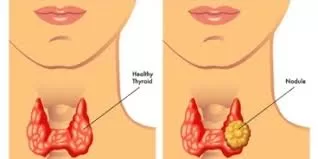
As January marks Thyroid Awareness Month, health experts are shining a light on the significant impact thyroid imbalances can have on women’s menstrual and fertility health. The thyroid gland, situated in the neck, plays a crucial role in regulating the body’s metabolism, energy production, and overall growth and development by producing hormones such as triiodothyronine (T3) and thyroxin (T4).
Thyroid disorders, including hypothyroidism and hyperthyroidism, are known to disrupt hormonal balance and can lead to menstrual irregularities and fertility issues in women, according to health experts.
Dr. Sweta Lalgudi, a gynecologist at Zynova Shalby Hospital in Mumbai, highlighted the association between thyroid disease and menstrual problems. “Thyroid disease can hurt one’s menses by disrupting hormone levels. Irregular periods are a common issue associated with thyroid disease, with hypothyroidism potentially causing heavy or prolonged bleeding and hyperthyroidism leading to light or infrequent periods,” she explained. Additionally, thyroid imbalances can result in amenorrhea, where menstruation ceases entirely, either as a primary condition or as a secondary occurrence in those who previously had regular cycles.
Fertility is also significantly affected by thyroid dysfunction. The imbalance can cause anovulation, a condition where the ovaries fail to release an egg during the menstrual cycle, leading to difficulties in conceiving. Dr. Lalgudi pointed out that thyroid imbalances might contribute to polycystic ovary syndrome (PCOS), a common endocrine disorder in women, potentially worsening menstrual irregularities.
Moreover, thyroid dysfunction increases the likelihood of complications during pregnancy, including preterm birth, preeclampsia, and developmental problems in the baby.
To identify thyroid issues promptly, health experts recommend tests such as T3, T3RU, T4, and TSH. These tests offer insights into thyroid function, allowing women to take timely action through medication, exercise, and dietary changes to enhance their overall well-being.
Dr. Rajesh Bendre, National Technical Head & Chief Pathologist at Apollo Diagnostics Delhi, emphasized the importance of comprehensive thyroid testing. “In addition to the standard TSH test, choosing tests such as Free T3, Free T4, and thyroid antibodies can offer a more comprehensive perspective on thyroid health,” he explained. “Consider also examining Reverse T3 levels, as they provide valuable insights into how the body converts T4 hormone into its active form.”
The experts also stressed the significance of lifestyle factors in managing thyroid health. Eating a healthy diet rich in vital nutrients, practicing stress management techniques like yoga and meditation, engaging in daily exercise, and maintaining an optimum weight are key aspects of improving thyroid health.
As the medical community continues to explore the intricate connection between thyroid health, menstrual cycles, and fertility, raising awareness about these interdependencies becomes vital for women’s overall well-being.










